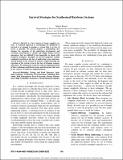Survival strategies for synthesized hardware systems
Author(s)
Rinard, Martin C.
DownloadRinard-2009-Survival strategies for synthesized hardware systems.pdf (139.1Kb)
PUBLISHER_POLICY
Publisher Policy
Article is made available in accordance with the publisher's policy and may be subject to US copyright law. Please refer to the publisher's site for terms of use.
Terms of use
Metadata
Show full item recordAbstract
Survival is a key concern of many complex systems. A standard approach to maximizing the likelihood of survival is to attempt to produce a system that is as free of errors as possible. We instead propose a methodology that changes the semantics of the underlying development and execution environments to cleanly and simply obtain survival guarantees that are difficult if not impossible to obtain with standard techniques. Examples of survival properties include continued execution in the face of addressing errors and guaranteed bounds on the amount of memory required during any execution of the system (even in the face of dynamic memory allocation).We summarize results for software implementations of these techniques and discuss issues and advantages that arise in the context of hardware implementations.
Date issued
2009-08Department
Massachusetts Institute of Technology. Computer Science and Artificial Intelligence Laboratory; Massachusetts Institute of Technology. Department of Electrical Engineering and Computer ScienceJournal
7th IEEE/ACM International Conference on Formal Methods and Models for Co-Design, 2009. MEMOCODE '09
Publisher
Institute of Electrical and Electronics Engineers
Citation
Rinard, Martin. “Survival strategies for synthesized hardware systems.” Formal Methods and Models for Co-Design, 2009. MEMOCODE '09. 7th IEEE/ACM International Conference on. 2009. 116-120. © 2009 Institute of Electrical and Electronics Engineers.
Version: Final published version
ISBN
978-1-4244-4806-7
Keywords
Automatic Synthesis, Error Processing, High Availability, Reliability, Testing, and Fault Tolerance, Reliability, Risk Management, Semantics of Programming Languages, Storage Management, Test Generation, Validation, Verification